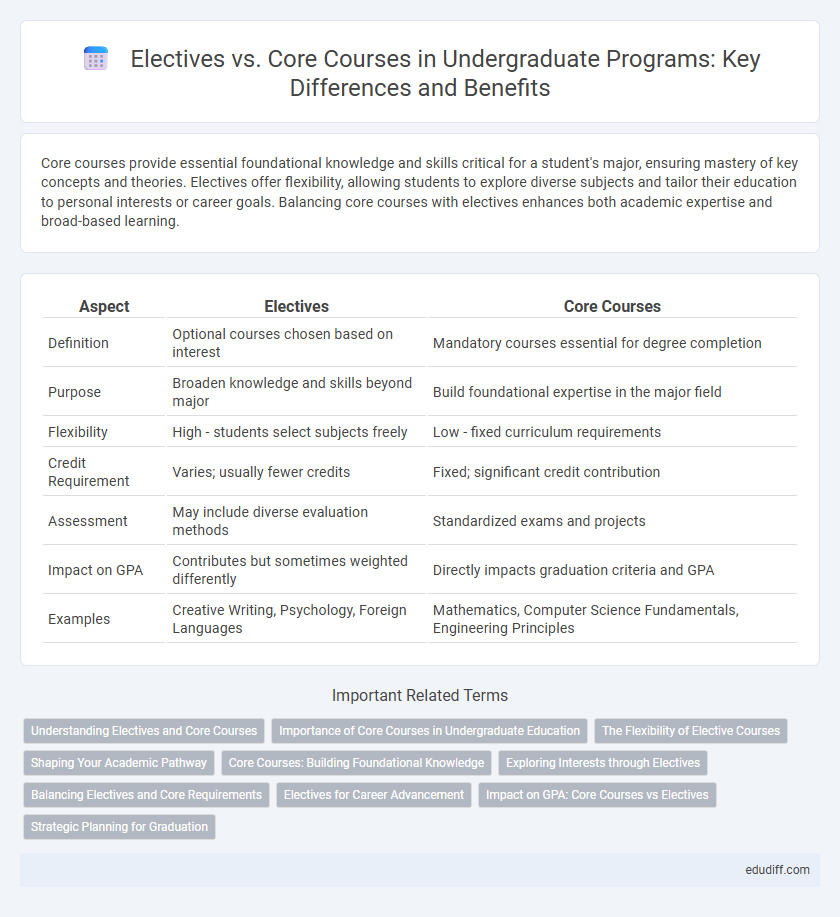Core courses provide essential foundational knowledge and skills critical for a student's major, ensuring mastery of key concepts and theories. Electives offer flexibility, allowing students to explore diverse subjects and tailor their education to personal interests or career goals. Balancing core courses with electives enhances both academic expertise and broad-based learning.
Table of Comparison
| Aspect | Electives | Core Courses |
|---|---|---|
| Definition | Optional courses chosen based on interest | Mandatory courses essential for degree completion |
| Purpose | Broaden knowledge and skills beyond major | Build foundational expertise in the major field |
| Flexibility | High - students select subjects freely | Low - fixed curriculum requirements |
| Credit Requirement | Varies; usually fewer credits | Fixed; significant credit contribution |
| Assessment | May include diverse evaluation methods | Standardized exams and projects |
| Impact on GPA | Contributes but sometimes weighted differently | Directly impacts graduation criteria and GPA |
| Examples | Creative Writing, Psychology, Foreign Languages | Mathematics, Computer Science Fundamentals, Engineering Principles |
Understanding Electives and Core Courses
Core courses form the foundational framework of an undergraduate program, providing essential knowledge and skills specific to the major. Electives offer flexibility, allowing students to explore interests outside their primary field or deepen expertise in specialized topics. Balancing core courses with electives enhances academic breadth and personal growth while fulfilling graduation requirements.
Importance of Core Courses in Undergraduate Education
Core courses form the foundation of undergraduate education by providing essential knowledge and skills in a student's major field of study. These courses ensure a comprehensive understanding of fundamental concepts, critical thinking, and analytical abilities necessary for academic and professional success. Mastery of core subjects is crucial for building a strong academic portfolio and preparing for advanced coursework or specialized electives.
The Flexibility of Elective Courses
Elective courses offer undergraduate students significant flexibility by allowing them to explore diverse subjects outside their core curriculum, enhancing interdisciplinary knowledge and personal interests. This adaptability helps students tailor their education to career goals and develop a broader skill set, which is increasingly valued in dynamic job markets. Unlike core courses, which are mandatory and structured, electives provide a customizable learning experience that fosters intellectual curiosity and academic exploration.
Shaping Your Academic Pathway
Electives provide students with the opportunity to explore diverse subjects, fostering a well-rounded education and enabling personalized academic pathways. Core courses establish foundational knowledge critical for mastering a specific discipline and ensuring academic rigor. Balancing electives and core courses strategically shapes a comprehensive undergraduate experience tailored to career goals and intellectual interests.
Core Courses: Building Foundational Knowledge
Core courses establish essential knowledge and skills required for academic success within an undergraduate program. These courses focus on fundamental concepts and theories that form the basis of specialized study in a major. Mastery of core subjects ensures a strong educational foundation, preparing students for advanced coursework and professional opportunities.
Exploring Interests through Electives
Electives provide undergraduate students the opportunity to explore diverse academic interests beyond their core curriculum, fostering intellectual curiosity and personal growth. Unlike core courses, which focus on foundational knowledge within a major, electives allow students to experiment with subjects from different disciplines, enhancing interdisciplinary skills and broadening career options. Incorporating electives strategically can lead to a more well-rounded education and improved adaptability in a rapidly evolving job market.
Balancing Electives and Core Requirements
Balancing electives and core requirements in an undergraduate curriculum fosters a well-rounded education, enhancing both depth and breadth of knowledge. Core courses provide essential foundational skills and discipline-specific theories, while electives allow exploration of diverse interests and interdisciplinary skills crucial for adaptability. Strategic selection of electives can complement core subjects, promoting critical thinking and specialized expertise tailored to career goals.
Electives for Career Advancement
Electives in undergraduate programs offer specialized knowledge and skills that align closely with specific career goals, enhancing employability and professional development. These courses allow students to explore industry-relevant subjects beyond core requirements, fostering adaptability in dynamic job markets. Strategic selection of electives can lead to targeted expertise, making graduates more attractive to employers in competitive fields.
Impact on GPA: Core Courses vs Electives
Core courses typically have a stronger impact on GPA because they are fundamental to the major and often carry more credit weight and rigorous grading standards. Electives usually provide flexibility and can offer opportunities to boost GPA if they are less demanding, but their influence is generally less significant compared to core courses. Strategic selection of electives that align with personal strengths can help optimize overall academic performance while fulfilling graduation requirements.
Strategic Planning for Graduation
Core courses build essential foundational knowledge required for degree completion, ensuring students meet all accreditation standards and graduate on time. Elective courses offer flexibility, allowing students to explore diverse interests and specialize within their major, enhancing their skills and employability. Strategic planning involves balancing core requirements with electives to optimize credit load, avoid course conflicts, and align with career goals for timely graduation.
Electives vs Core Courses Infographic

 edudiff.com
edudiff.com